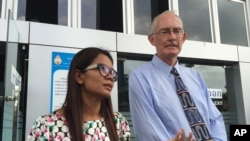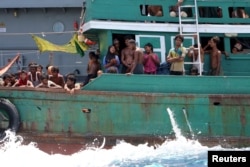In Thailand, a criminal defamation case brought by the Royal Thai Navy against an Australian publisher and a Thai reporter is again highlighting the military government’s clampdown on the news media.
Australian publisher Alan Morison and Thai reporter Chutima Sidasathian face up to seven years in prison for charges related to a June 2013 news article published on their online news service Phuketwan.
The story published excerpts from a Reuters news agency report that exposed the smuggling networks taking Rohingya Muslims from Myanmar through Thailand.
The initial report accused “Thai naval forces” of benefiting from the smuggling trade, but Phuketwan says this was not a direct reference to the Royal Thai Navy.
The two appeared in court this week to face criminal defamation charges. Reuters news agency, whose journalists in Thailand won a Pulitzer Prize for their Rohingya news coverage that year, faces no charges.
International support
The journalists have received widespread international support from rights groups and media as well as the United Nations, which publisher Morrison has welcomed.
“It’s terrific to know that so many people support the concept of the freedom of the media and freedom of expression. It’s a perfect storm in some ways because the Rohingya issue is pretty clear cut and so is the issue of the need for a free media and democracy,” he said.
Phuketwan has long reported on the people smuggling trade. In May this year Thailand finally launched a crackdown leading to dozens of arrests after up to 200 mass graves of largely Muslim Rohingya people were uncovered in southern Thailand and neighboring Malaysia.
The Phuketwan reporters earlier turned down offers by the Royal Thai Navy that if they made a public apology the navy would drop the charges. The reporters say they see no need to apologize for doing their job.
Benjamin Zawacki, a rights’ advocate and visiting fellow at the Harvard Law School, says the case is a test of media freedom but also the military government’s efforts to see the case fully resolved.
“I don’t see them actually serving time but I don’t see them apologizing either and so you’re either going to have a legal technicality by which the case is dismissed or you have a conviction and have them pardoned or a nominal fine and a suspended sentence or something like that is my expectation,” he said.
While the scheduled prosecution and defense hearings are being presented this week a final ruling in the case is not due until mid-August.
Procedural issue
Kinglsey Abbott, a legal adviser with the International Commission of Jurists, says the Thai government should have set aside the charges rather than allowing the case to go to trial.
“Our primary concern at the moment is to see that a fair trial is provided to the two journalists and I can only reiterate the call previously that these charges be dropped immediately and unconditionally against the two journalists," he said. "The primary reason for that is that we have concerns about the use of criminal defamation laws to prosecute what should be free speech.”
Thailand’s state of media freedom has come under pressure including under recent civilian governments such as that of the government of deposed Prime Minister Yingluck Shinawatra.
The Paris-based Reporters without Borders ranks Thailand 134th from 130 in 2014. Independent media watchdog, Freedom House, categorizes Thailand’s media as “not be being free.”













